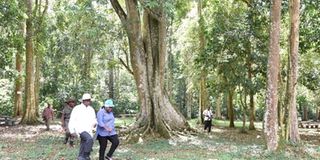NFA re-marks Mabira forest boundaries

President Museveni (wearing hat) tours Mabira Forest in December 2016. The forest has been heavily degraded. File Photo
What you need to know:
- A 2017 Ministry of Water and Environment sector review report indicates that “Out of the 30,000 hectares of Mabira degraded land, 1,500 hectares are under restoration and more 4,755 hectares had been mapped for farther restoration.”
- The 300 square kilometre forest has been facing encroachment from charcoal burners, timber harvesters, farmers and settlers.
National Forestry Authority (NFA) has started re-demarcation of Mabira Forest boundaries to reclaim land lost to encroachers.
Mr Levi Etwodu, the NFA director of natural forests management, said on Friday that since the forest was gazetted in the 1930s, its boundaries had never been re-set even with the increased encroachment.
“We have seen that the forest land has been increasingly encroached on especially along the boundaries and around the enclaves [villages]. This is why we are re-marking them and ensuring we reclaim the land,” Mr Etwodu said.
There are more than 15 villages in Mabira Forest, who have lived there legally before the forest was gazetted.
Last week, NFA officials announced that government was in advanced stages of buying off the 16 villages living in the forest to avoid further damage on the forest.
86 villages affected
Mr Micheal Ojja, the sector manager of Mabira, said at least 86 villages in and around Mabira have been affected by re-demarcation exercise.
“Our technical team have been talking to residents as they trace the boundaries. Most of them had entered into the forest land and have been requested to leave which they have done without problems save for a few who poised resistance,” Mr Ojja said.
During an on-ground tour in the re-demarcation exercise, it was observed that a number gardens, especially sugarcane, sweet potatoes, beans and maize were on the forest land.
Mabira forest is home to several bird, animal, tree, flower, and insect species. The forest also acts as a catchment for Lake Victoria and River Nile waters in addition to providing with relief rainfall and local herbs to the residents.
However, the 300 square kilometre forest has been facing encroachment from charcoal burners, timber harvesters, farmers and settlers.
“We have started with Mabira and soon we shall roll to another forest. We need about two years for Mabira depending on the finances we shall have. We operate on a very small budget of only Shs30 billion which is too small a budget,” Mr Ojja said.




